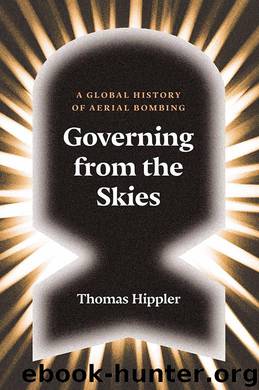Governing from the Skies: A Global History of Aerial Bombing by Hippler Thomas

Author:Hippler, Thomas [Hippler, Thomas]
Language: eng
Format: azw3
Publisher: Verso
Published: 2016-12-31T16:00:00+00:00
If war was national, it was then necessary to defeat the morale of the enemy nation in order to triumph.24 In the end, the strength of an army is nothing other than the strength of the nation as a whole.25
This strength depended on two factors: industrial power on the one hand, and political, social, and ‘moral’ cohesion on the other. This combination of an economic element and a political and ‘moral’ one is clearly very problematic, directly bearing on fundamental questions of liberalism. Douhet’s use of the concept of ‘nation’, in fact, has affinities in some respects with that made by such thinkers as Adam Smith or Emmanuel Sièyes: in each case, the economic is bound up with an underlying political cohesion. In other words, this concept of nation is less ‘nationalist’, in the modern sense of the term, than political: it denotes either the community of citizens and their attachment to the res publica – a definition of the nation that is certainly not far removed from a democratic one26 – or else something like ‘civil society’, a concept that likewise links economic determinations with a ‘public opinion’.27 At all events, the concept of nation that Douhet deployed was not ‘totalitarian’, inasmuch as it emphasized the spontaneous adhesion of citizens to the community and its values.28
On the other hand, government action and political stability also play a far from negligible role in his political reflections: the ‘people’ are not simply the foundation of all political cohesion, they are also a factor of destabilization. Political power thus needs to contain this ‘people’ in order to impose order. From this point of view, the concept of ‘nation’ that sits at the heart of Douhet’s reflections on war is broadly in line with republican thought, and even modern democratic thought. As a source of both political unity and destabilization, the nation is not only the principal actor in modern war, it is simultaneously its target.29 If it is ‘faith and hope’ that decide the outcome of a war, then it is these moral dispositions that must be attacked in the enemy nation.
The ‘nation’ also possesses a further determination, distinct from the sense acquired by the concept since the late nineteenth century: it is no longer defined in opposition to other nations, and ‘nationalism’ in no way rules out a cosmopolitan dimension. Douhet thus reactivated an older political semantics, according to which, to quote Eric Hobsbawm, nations are simply ‘a second-best to world unity’.30 In this perspective, Douhet borrowed from the tradition bequeathed by the Enlightenment the idea of a ‘European civil society’ linked to a transnational public opinion, and explained that ‘civilized nations produce public opinion, which sees with its own eyes and judges as a function of its own mentality; they constitute a kind of public that judges by basing itself more on sentiment than on cold logic’.31
The nation is based on ‘society’, and both concepts are transnational by nature. Public opinion, itself also transnational, decides what is just or unjust, in the manner of a tribunal of practical reason.
Download
This site does not store any files on its server. We only index and link to content provided by other sites. Please contact the content providers to delete copyright contents if any and email us, we'll remove relevant links or contents immediately.
| Anarchism | Communism & Socialism |
| Conservatism & Liberalism | Democracy |
| Fascism | Libertarianism |
| Nationalism | Radicalism |
| Utopian |
The Secret History by Donna Tartt(16682)
The Social Justice Warrior Handbook by Lisa De Pasquale(11496)
Thirteen Reasons Why by Jay Asher(7810)
This Is How You Lose Her by Junot Diaz(5806)
Weapons of Math Destruction by Cathy O'Neil(5058)
Zero to One by Peter Thiel(4841)
The Myth of the Strong Leader by Archie Brown(4797)
Promise Me, Dad by Joe Biden(4463)
Beartown by Fredrik Backman(4447)
How Democracies Die by Steven Levitsky & Daniel Ziblatt(4431)
Stone's Rules by Roger Stone(4427)
The Fire Next Time by James Baldwin(4357)
100 Deadly Skills by Clint Emerson(4095)
A Higher Loyalty: Truth, Lies, and Leadership by James Comey(4045)
Rise and Kill First by Ronen Bergman(4029)
The David Icke Guide to the Global Conspiracy (and how to end it) by David Icke(3900)
The Farm by Tom Rob Smith(3884)
Secrecy World by Jake Bernstein(3793)
The Doomsday Machine by Daniel Ellsberg(3743)
